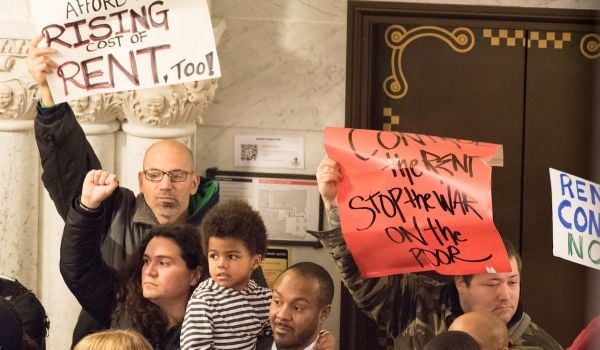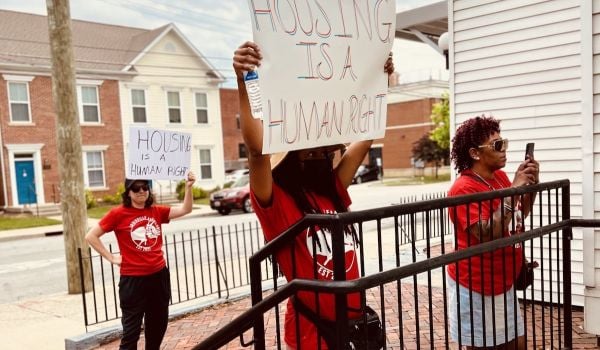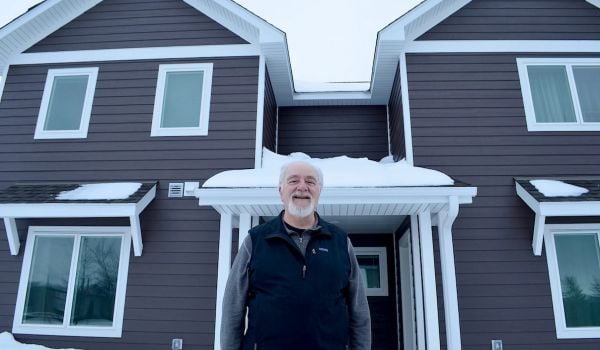This story is the second and final part of a short Backyard series examining the aftermath of St. Paul’s new rent control measures. Our previous story looked at how landlords are finding ways around the new rent regulations.
Last year, St. Paul voted for one of the strictest rent control laws in the nation. Yet months after the law was enacted, an affordable housing developer in the city is raising rents so high that low-income seniors are moving out of their buildings.
Dominium, a corporate landlord with properties across the country, asked for and received an exemption to the new regulations. Tenants are now appealing that request, and the city’s decision may be the first test of the rent stabilization law and how well it will protect vulnerable tenants.
Katherine Banbury, who with fellow tenant Hannah Gray is appealing Dominium’s exemption, says seniors in her building are already being displaced as the appeal winds its way through the city.
“They’re moving out, they don’t know where they’re going,” Banbury says of some of her neighbors. The vacancy rate in the Twin Cities metro area is about 3.6% as of fourth quarter 2021, making it hard for them to find alternative housing.
Last November, 53% of St. Paul residents approved a ballot measure to limit residential rent hikes across the city to 3%. But when the law was crafted, it let landlords easily hike rents up to 8%, to guarantee a “reasonable return on investment,” by submitting a request. That request, as it turns out, is automatically approved. (An exemption granting an 8% to 15% increase requires an audit by city staff.)
Dominium immediately applied for and was granted an exemption, asking to raise rents by 8% in a number of their buildings. But Banbury and Gray, residents of one of Dominium’s buildings for seniors, have appealed Dominium’s rent hike, claiming that the company misstated its numbers. The city’s decision in the appeal could determine the extent to which tenants in the city’s subsidized housing can expect to be protected by the law.
To help determine what counts as a reasonable return on investment, the city asks landlords to fill out a Maintenance of Net Operating Income (MNOI) worksheet. The worksheet requires landlords to detail their profit from rent and late fees after all operating expenses have been paid. Landlords must prove that over time their profit margins decreased due to inflation, property taxes, or increased maintenance costs.
In its response to the Banbury and Gray’s appeal, Dominium argued that owners of federally subsidized affordable housing should have greater leeway when profit margins are estimated since they make less money from rent. It’s an argument that Banbury and her attorney Jack Cann, who works with the Housing Justice Center, say is bizarre, as Dominium receives millions of government dollars to keep the rent low.
“It’s ridiculous because they get all kinds of public funding,” Banbury says.
In their response to Banbury’s appeal, Dominium’s attorneys wrote that Low Income Housing Tax Credit properties “are financially vulnerable because they provide lower rents for Residents,” and that the underwriting from the federal government left them to “operate on thinner margins than comparable market-rate properties.”
“What they were basically doing is pleading poverty,” Cann says. “All of it bullshit. They can keep the rents low because they get tens of millions of dollars of public assistance.
Cann also pointed out in the hearing that the rents listed by Dominium on their exemption request were added up incorrectly, allowing the company’s rental income to appear lower than it is. A city-appointed hearing officer asked Dominium to resubmit their worksheet, Banbury says. A request to Dominium from Next City for comment was not returned.
The next hearing is scheduled for September. After an opinion is issued, the case can be appealed to city council and then might end up in court, which Cann says is likely. There could be other changes to the law that would work in Dominium’s benefit: The city council will also hold a hearing later this month on whether affordable housing should be exempted from the rent laws and whether new construction should get a 15- to 20-year exemption.
Banbury says exempting Dominium would lead to stark rent hikes like the ones the company is pushing through across the Twin Cities metro area.
This has been the experience of Jen Bragelwoman, 74, a former ICU nurse living in a means-tested Dominium building in Coon Rapids, a suburb outside of Minneapolis. She lives on a fixed income from social security and pays $1,300 a month for a two-bedroom.
When Dominium announced a 12.5% rent increase, Bragelwoman collected 131 signatures from 167 units in her building and helped organize protests across 10 other Dominium owned buildings nearby. She got several elected officials on board, but Dominium initially refused to meet with them about walking back the rent increase.
“They always take the highest amount, always,” Bragelwoman says of Dominium. At a protest in front of a newer Dominium building in Cottage Grove, residents pleaded in person with Dominium vice president Jack Sipes not to raise their rent, explaining that they were on fixed incomes and would not be getting raises to accommodate the 12.5% increase that was planned.
“A lot of us are too old, too ill to work, we have health problems,” Bragelwoman told him. According to her, Sipes told the crowd, “I know you guys have savings.”
Yet city council members have proposed a series of revisions to the rent law in the past week, according to the Star Tribune. The revisions would allow landlords to defer rent increases – so that, for instance, landlords could raise rent 6% after two years rather than 3% over one year. It would include a very narrow “just cause” provision to prevent evictions only if they are tied to these deferred rent increases. It would also add stronger language to prevent landlords from raising utility costs to get around the 3% limit, another recurring issue. There will be a hearing on the legislation Aug. 17, and any changes would not become law until Jan. 1.
Councilmembers who authored the revision bill made it clear that they don’t want rent control to disincentivize new construction. Developers paused new projects last November when voters approved the ballot measure. Yet it’s not clear that developers’ fears of losing money on new projects align with the reality of the law – the average annual rent increase in the Twin Cities over the past 20 years was 2.3%, as opposed to the 3% permitted under the ordinance. And developers can still raise rents up to 15% if they are granted an exemption.
One issue is that the city uses property taxes as a way to build affordable housing, something mentioned in the bill seeking revisions, leaving legislators incentivized to spur market-rate construction.
Cann says that excluding affordable housing from the law would make no sense.
“It’s totally stupid, it’s throwing Dominium tenants to the wolves,” he says. “All over the state, Dominium tenants, mostly elderly, have been getting together and saying this is awful, they’re raising the rent to get every penny they can get out of us.”
This article is part of Backyard, a newsletter exploring scalable solutions to make housing fairer, more affordable and more environmentally sustainable. Subscribe to our weekly Backyard newsletter.

Roshan Abraham is Next City's housing correspondent and a former Equitable Cities fellow. He is based in Queens. Follow him on Twitter at @roshantone.


















